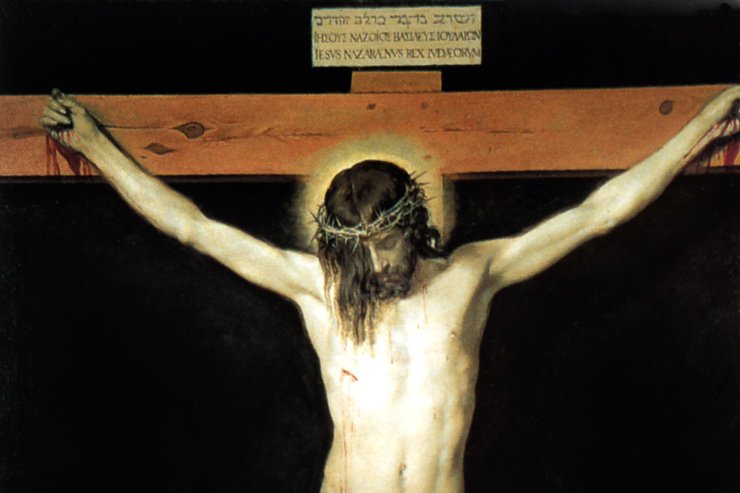“The disciple of Christ consents to ‘live in the truth,’ that is, in the simplicity of a life in conformity with the Lord’s example, abiding in his truth. ‘If we say we have fellowship with him while we walk in darkness, we lie and do not live according to the truth.” (CCC, 2470)
I first interacted with Father Roger Landry in early 2010 when Deacon Mike Bickerstaff and I were seeking Catholic writers for our new Integrated Catholic Life website. I came across an online article online written by Fr. Landry that impressed me. This Catholic priest wrote with great clarity about the truth of our Catholic faith, and I became an immediate fan of his writing.
It would be perfectly reasonable for you to ask, “What is so special about a Catholic priest sharing the truth of our faith?” That is a fair question, but I am interested in Fr. Landry because of his humility, his obvious devotion to Christ, his love of the Church, and his exemplary priesthood. He is also a gifted teacher whose writing, homilies, speaking, and spiritual retreats are feeding countless Catholics who want to go deeper and grow in their faith.
This native of Lowell, Massachusetts grew up in a devout Catholic home with three other siblings. At the age of four he discerned the first hints of his vocation to the priesthood while observing his parish priest during Mass. He remembered thinking to himself, The priest must be the luckiest man in the whole world — capable of holding God in his fingertips and giving him to others. Later while attending Harvard University and still considering the priesthood, he met a couple of Opus Dei priests at an off-campus Catholic study center. These faithful priests challenged, encouraged, and helped Fr. Landry gain more clarity about his calling. In his senior year at Harvard, the call to holiness became clear to him:
“By that point I had recognized that my principal vocation was the fundamental calling of every disciple, to be a saint, to allow God’s love to become the defining reality of my life, and to allow that love to overflow back to God and toward others. The question of what God was asking of me in terms of a state of life in the Church was secondary to this call to holiness. And so I decided totally to entrust myself to God and just ask him for the graces to take this primary vocation seriously because I was feeling the pressure to prepare for what would happen after college, whether medical school, or political work advancing the pro-life cause, or something else.”
Shortly after this epiphany, he prayed a novena to the Blessed Virgin, to whom he had consecrated his vocation, and he said this prayer each day after he received Holy Communion: “Lord, whether you want me to be a priest, a garbage collector, or anything else, please give me the vocation to do it with the spirit and the fervor of the saints.” On the ninth day of the novena, unexpectedly, while sitting in a quiet chapel, God gave him the answer within. He was being called to the priesthood. Fr. Landry says this filled him with a sense of peace and conviction that he has never lost, despite the challenges and crosses encountered along the way.
Father Landry was ordained as a priest by (then) Bishop O’Malley in 1999. After spending several years in Rome to further his education, stints at other parishes and schools and serving as executive editor of the weekly diocesan newspaper in Fall River, Massachusetts, Fr. Landry was formerly the pastor of St. Bernadette Parish in Fall River. he currently also serves as the national chaplain for Catholic Voices USA and serves at the Holy See’s permanent mission to the United Nations.
When I interviewed him for my sixth book, Joyful Witness, I asked him why so many of us fall short of living in the truth of our Catholic faith. Here is his candid response:
“I long for the day when every Catholic priest—and every Catholic disciple—will be known as someone who ‘lives in the truth of our Catholic faith!’ I think it’s a minimal expectation and the path of true happiness, not a dry martyrdom!”
Even among practicing Catholics today, it can seem that God is asking something heroic of us when he commands us to put him first by praying each day, watch their language, worship him at Mass on Sunday, reverence gratefully those who gave them life, do no harm to their neighbor, love rather than use others sexually, respect others’ property, tell the truth, and be happy rather than envious at another’s good fortune.
But that’s the culture in which the Church is now seeking to proclaim the Gospel with freshness—where what was once the minimum has become the maximum and what was once routine has become radical. In a sense, however, that’s a great place to be starting the new evangelization, because we can’t presume the building blocks any longer. We need to lay those foundations. And if we can get people excited about the pillars and laying them correctly, then it’s much easier later to build.”
What makes Fr. Landry stand out is the challenging, yet loving message he delivers whenever he is discussing our Catholic faith. There is no ambiguity, no gray area. He loves Christ and his Church, has studied our faith for many years, and is determined to live out his priestly vocation to the fullest. He is focused on our Heavenly home and desires to help as many people get there as possible. In our own lives as laypeople, can we see the obvious benefits of focus, clarity, love for Christ that knows no limits, and a sincere desire to serve Him and those around us?
When I asked Fr. Landry how he encourages his parishioners and others he encounters to live in the truth of our faith, he shared five practical ways in particular.
- He preaches the gospel as “Good News” rather than “bad news.”
“Jesus said, ‘You will come to know the truth and the truth will set you free’ (John 8:32). The truth that God has revealed is not only splendid but a genuinely liberating force. So often people look at Jesus’s more challenging truths as moral and existential straightjackets, but they’re exactly the opposite. In Jesus Christ, God has given us a map to find the greatest treasure ever, the answer key to the greatest questions any human being has asked. The good news really is good news.”
- He presents the real Jesus. Rather than present a domesticated version of Jesus that is lifeless, boring, and unchallenging, Fr. Landry says:
“The real Jesus was radically countercultural and unbelievably attractive. He had crowds following up and down the shore of the Sea of Galilee to listen to him speak, sometimes for several days. They would carry their loved ones on stretchers for miles just to be in his presence. At his word, “Come, follow me!” men would leave their livelihoods, their families, and all they knew to accompany him, not having any clue where he was heading.
“Once the idea that Jesus is a warm cuddly bear who basically loves us so much that he indulges all our vices with a benign shrug of the shoulders is replaced by a Jesus who loves us so much that he was crucified to save us from those vices, who overturns tables when we’re being abused by money-changers, and who tells us to pluck out eyes and cut off hands if they lead us to sin, then it’s easier for us to understand how Jesus would be challenging us with love to live in the truth today.”
- He always tries to feature the primacy of God’s grace.
“Everything begins with God’s help. He doesn’t call us to anything without giving us all the assistance he knows we’ll need to achieve it. He doesn’t leave us orphans on our own. Rather, he stays with us and seeks to have us freely yoke ourselves to him so that we can reach those standards together. He gives us this help in prayer. He gives us this help—he gives us himself!—in the sacraments. He gives us this help in the Word of God. He gives us this help in the crosses by which we die to the world and allow him truly to come alive within us. He gives us this help in the example and intercession of the saints, especially the help of his Mother.”
- He strives to explain the why behind the what.
“Many times people reject the teaching of the Church because they can’t figure out how it is part of God’s love for us. They don’t see it as an essential part of our happiness, how it’s essential for our full flourishing. For example, if people think that ‘turning the other cheek’ means allowing themselves to be physically abused rather than sticking up for their dignity and putting an end to the violence without vengeance or retaliation, it’s totally understandable why people would reject not only that teaching but also question Jesus’s goodness and teaching authority in general. If people think the call to chastity for those with same-sex attractions means subjection to a lifetime without love, it’s understandable why people would reject it. When it’s explained, however, as the means by which we’re able to have Christ-like love (agape) purify relationships so that sexual attractions (eros) don’t destroy the love of friendship (philia), then people begin to see how, though countercultural, it points to the path of wisdom.
“Once people have a chance to understand the why behind the what of the Church’s teaching (an urgent concern today when the secular media regularly distorts Church teaching), they’re far more open to follow Christ and his Church.”
- He tries to set an example of the Christian struggle toward holiness.
“Jesus never merely said, ‘Do what I say!’ He always said, ‘Follow me!’ I think a priest needs to do the same. People might think sanctity is somehow easy for a priest, but I try to help them to see how priests are among the devil’s preferred targets. I talk about my own struggles to align my life with the truth Jesus gives us. Like St. Paul, the good I want to do I often fail to do, and the evil I want to avoid I often don’t avoid (see Romans 7:19). I remind them that I, too, mean the words, ‘I have sinned…through my own…most grievous fault,’ and I go to confession every week.”
The Lure of Lukewarmness
What prevents us from living in the truth? What are the obstacles that slow us down or lure us down the wrong path? One of the major culprits in today’s world is lukewarmness. Fr. Landry identified three causes of lukewarmness, and he stressed the importance of understanding these causes because the remedy will vary depending on the cause.
Not being exposed to people on fire for their faith. Many Catholics just go through the motions because they haven’t been exposed to Catholics who are giving their all. The cure for this kind of lukewarmness is falling in love with Jesus—and often that can happen by close association with someone already very much in love.
Satisfying the hunger for God with other things. Many of us diffuse our passions for the things of this world. We become fanatic for sports team, artists’ music or Hollywood gossip, high-tech video games, particular political candidates, work and career, cars, clothing, and jewelry, our golf handicap, or other worldly pursuits. These more immediate passions can make us apathetic to the things that matter most. It’s a type of spiritual worldliness that can’t help but leave us lukewarm, if not ice-cold, about the things of God. Jesus said, after all, “Where your treasure is, there will your heart be as well,” and in the Book of Revelation, materialism was named as the cause of the Laodiceans’ tepidity.
For this type of lukewarmness, what often works the most effectively is something that shatters a person’s vanity of vanities. It can be the diagnosis of an illness in them or in a loved one. It can be a sudden death. It can be the loss of a job or the breakup of a relationship. Any one of these things can help someone to see that what he or she formerly sought was insufficient and there’s a need for something more.
Allowing sin to reign. If someone is caught up in a dissipated lifestyle—dishonesty, drug use, impurity, and so on—he or she is never going to be fervent. The only path forward for this person is to be set free from the entanglements that prevent spiritual growth. For most people, that’s going to require more than just self-restraining will-power. It’s going to require the grace of the sacrament of penance.
Three Ideas for Living in the Truth of our Faith
If we are prepared to live in the truth and pursue lives of holiness, here are three ideas for us to act on in our daily lives:
God is asking something heroic of us every day. As Catholics in today’s world, we must recognize that God commands us to put him first in our lives by faithfully praying to him every day, worship him on the Lord’s day, respect all of life, and engage in a host of other tasks that defy the world’s seductive call.
Don’t be afraid to be countercultural. Jesus was the ultimate radical and his example is one we should follow in today’s world. He spoke the truth, showed love and mercy to everyone and kept his gaze on heaven. Fr. Landry reminds us that Jesus is not a warm cuddly bear who winks at our sins, but is God made man who loved us so much that he was crucified for our sins and rose again.
Avoid Spiritual Worldliness. When the longing in our hearts for God is seemingly replaced or satisfied by the offerings of the world, lukewarmness is the result. We spread ourselves too thin with our desires to have a more expensive car, a bigger home than we need, expensive jewelry, too much time with our smartphones and the Internet, etc. We should keep our focus on our heavenly home and the good things God has in store for us, not the temporary and false pleasures of this world.
Questions for Reflection
- Am I honestly being responsive to God’s call to be heroic and holy each day? How would heroic holiness manifest itself in my life? What, if anything, is getting in the way?
- Am I ever lukewarm in my faith? Do any of Fr. Landry’s three suggested causes resonate with me?
- Are there Christians in my life who are on fire with love for Christ? What qualities do I see in them to emulate? How does their faith impact my own?
- Am I willing to be “countercultural”? Am I willing to go against my friends, peers, and others in defense of my faith? Am I more concerned with pleasing them or pleasing Christ?
This post was adapted from Joyful Witness: How to Be an Extraordinary Catholic with the permission of Servant Books and the author.
Editor’s Note: Would you like to learn more about “regular Catholic heroes” and the joyful witness they give for Christ and the Catholic faith? Randy Hain’s exciting and popular sixth book, Joyful Witness: How to Be an Extraordinary Catholic (Servant Books) is available through Amazon and all Catholic bookstores! All of his books are available through Amazon.com.















